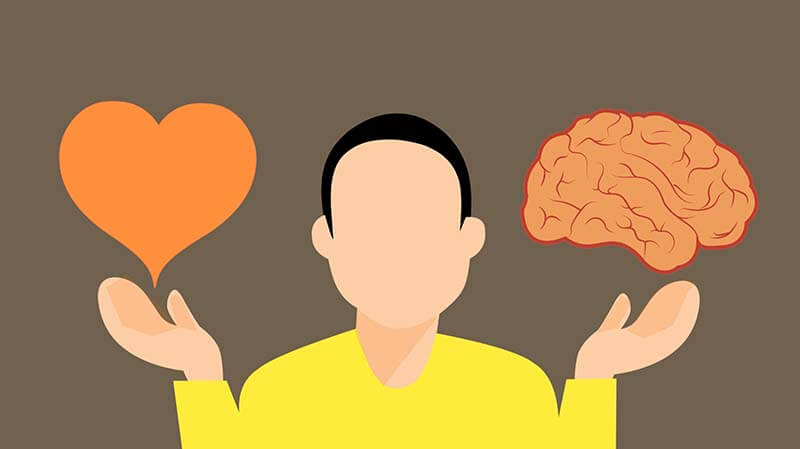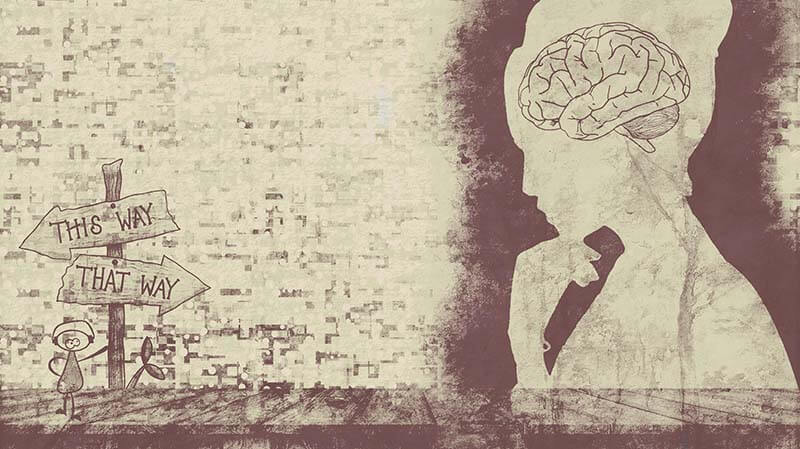In this post, you’ll learn how to improve your intuitive thinking and make better decisions. You’ll also discover what intuition is and where it comes from. These are the exact concepts hundreds of my students have used to excel in their careers, finances, and personal lives.
Let’s dive in.
Table of Content
(Interested in maximizing your personal power? Learn more about the Mind Power course)

6 Exercises to Develop Intuitive Thinking
The more you use and understand intuition, the more effective it becomes.
The central nervous system connects collective consciousness and our body. So the physical body becomes the vehicle for the message. When we trust the feelings and hunches that come from our cellular bodies, we strengthen that connection. And the line becomes stronger.
This process has nothing to do with logical rational thinking. It bypasses the logical mind.
With practice, we can learn what intuition feels like and recognize it when it happens.
Some people find that meditation, yoga or other relaxation techniques help clear the mind and allow intuition to flow more freely. Other people find that keeping a journal or writing down their thoughts and dreams helps them to better understand their intuitive thoughts and hunches.
Here are some intuitive thinking exercises you can experiment with:
1. Pretend You Know
Even if you have no information about the subject matter, imagine what it would be like to know the right course of action.
This technique is particularly helpful if you notice a lot of your thoughts start with “I don’t know how” or “I can’t”.
The phrase “I don’t know” is an intuition killer. It stops the creative mind dead in its tracks. So instead, try to start your thoughts with “Maybe…”. For example: “Maybe I could follow this path and turn around if it doesn’t work out.”
Another prompt you can try is: “If I knew what I don’t know, I would…”. For example: “I don’t know anything about this person. But if I knew them, I would not trust them with this. My intuition tells me they’re flaky.”
2. Flip a Coin
If you have a dilemma to resolve and can’t make up your mind, flip a coin or have someone flip a coin for you. When the coin lands, notice your emotional response to the outcome.
You might feel relieved, excited, bothered, or sad. This is your intuition speaking. Listen to it and reverse the outcome of the coin toss if you feel inner resistance to it.
3. Pause
A lot of people don’t take the time to listen to their intuition. Their rational mind is busy thinking. So much so that they don’t hear the subconscious whispering intuitive solutions.
When faced with a decision or a problem, practice pausing. Take a brief moment to check within before moving forward.
If someone invites you to an event, don’t answer right away. Pause for the time of one full breath. And ask yourself: “How do I feel about this? What is my body saying? What do I really want?”
4. Pay Attention to Your Dreams
As I wrote in another blog post:
“Dreams are the intimate conversations we are having with our subconscious and our soul.”
Dreams are a powerful communication channel between the conscious and subconscious minds.
Not only do I encourage you to write down and try to interpret all your dreams, but I also recommend you follow a practice I call dream incubation. Before going to sleep, make an ask of your subconscious in the form of an affirmation. Repeat it a dozen times, then let go of it. Relax your mind as you go to sleep.
The affirmation will sound something like “Tonight, I will dream and I will remember my dream and the dream will show me whether I should take the job offer.”
When you wake up, make a conscious effort to remember your dreams and write down whatever you recall in your dream journal. The longer you wait, the more details you’ll lose. Write a few paragraphs about each dream and try to interpret their meaning.
This process should channel your intuition and provide new perspectives on the problem you raised the night before.
5. Use the 2-Second Rule
Practice listening to your gut feelings and act on them even if they don’t make logical sense. One way to do this is to force yourself to commit to decisions before the conscious mind kicks in.
Hence the 2-second rule.
See someone you feel you should meet? Start walking towards them immediately. Act on your hunch before thoughts like “What am I going to say?” or “I don’t want to interrupt them” interfere.
Trust your first impressions of people and situations and act on them quickly—intuitively.
6. Relax
When you face a problem, try to relax and let go of any attempt to solve it. Instead, go for a walk, take a nap, a warm shower, or meditate.
When you relax, you’re more likely to connect with and sense your intuition.
In fact, lots of scientists and entrepreneurs are known to have had their best ideas while away from their desks.
Thomas Eddison, for example, practiced snoozing in an armchair holding something in his hand, like a set of keys. As he would drift off into sleep, his hand would relax and the item would drop. This prevented him from fully falling asleep and would keep him at the edge of awakeness.
He pulled some of his greatest ideas from this relaxed state. And you too can practice relaxing your mind to let your subconscious shine through.

What Is Intuitive Thinking?
Intuitive thinking is a form of thinking that allows us to make decisions without the need for analysis, reason, or logic.
Intuitive thinking can happen in everyday life situations. It may help you decide what gift someone you’ve recently met might like. Or make an accurate diagnosis of illness without medical data.
“I woke up this morning with the most peaceful feeling, knowing I had the job.”
This is what one of my students, Sharon, shared with a small group of us on the day she landed a plumb job with an advertising agency. Over a hundred people had applied and though she felt she had done well in the interview, realistically there were probably dozens of others who had done well. Yet, upon awakening, something in her “knew.”
Sure enough, they called her that morning and offered her the position.
Intuitive thinking isn’t the same as guessing. It comes as a feeling, not a thought. It often occurs outside our conscious awareness. And unlike thoughts, it resides in the body, not the mind.
The opposite of intuitive thinking is rational thinking. Rational thinking requires analysis and reason. Intuitive thinking relies on gut feelings and instincts.
Sometimes, your rational and intuitive minds are going to pull you in two opposite directions.
The subconscious mind knows things the rational mind doesn’t. It takes into account all the relevant information, including emotional and non-verbal cues. This is why it’s often more accurate.
Where Does Intuitive Thinking Come From?
For the most part, intuition is a result of experience.
Conscious experiences shape the subconscious over time—the way your boss looks at you, the sound your car makes when you start it, or the smell of a Malaysian dish you had last year.
Your intuition identifies patterns across these past experiences to predict what will be safe, fun, costly, painful, etc. in the future.
The second component of your intuition is the “collective unconscious”, a phrase coined by the Swiss psychoanalyst Carl Jung. The collective unconscious is not limited to our personal knowledge and experiences. It is the collective wisdom of all knowledge past, present and, in a strange way, even future.
Does Everyone Have Intuition?
Intuition is a function of the subconscious. We all have it and it works for everyone. In my twenty-three years of teaching Mind Power, I have never met a person who cannot tap into their subconscious and use their intuition.
Obviously, the more you use and understand it the more effective it is. Like anything, practice makes you better.
Your trust and belief in your intuition have an effect as well. If, for example, you laugh and scoff at intuition as an old wives’ tale, it will be unlikely that your intuition will come to you or that you will be receptive to it.
On the other hand, if you believe in intuition, watch for it and act upon it when it does arrive, it will frequent you more often.
Note that intuition isn’t omnipresent. Even intuitive thinkers don’t have intuition about everything.
Don’t force intuitive thinking. It’s an automatic process guided by the subconscious. If you don’t feel intuition in a specific situation, you can always rely on rational thinking to move forward.
What Is an Intuitive Thinker?
Intuitive thinkers are able to make decisions without needing a lot of information. It’s as if their minds were filled with some kind of innate knowledge. A 6th sense, if you will.
This ability allows them to act quickly and confidently in any situation. When faced with uncertainty, they let their instincts guide them—sometimes against all logic.
An intuitive thinker might, for example, quit a job they love because their intuition says there’s something else out they ought to do. They don’t know what it is, but they leap because they know to let their instincts guide them.

How Can We Use Intuition to Make Better Decisions?
So why would intuitive thinking be useful?
Sometimes we don’t have the time or resources to do a full analysis of a situation. And our gut feeling can be just as good—if not better than—as rational thinking.
But you don’t use your intuition to get answers. Through intuition, you access the wealth of information already within your subconscious.
In tapping into your subconscious, you are connecting to the web of all reality. Each of us has a personal subconscious which contains every event of our life.
Our subconscious is not limited by time and space; it transcends physical reality. It is, in many ways, the ultimate Internet connection. Whatever you need to know, you can go within and discover it.
One way to use intuition is to know when to break established rules or step outside of our comfort zone.
When faced with important decisions, try to set your thoughts aside and listen to your body. Remember, intuition comes as a feeling and can manifest in strange ways. So it’s important to make space for intuition to come through.
If intuition were the sun, then imagine thoughts as clouds. Learning to clear your thoughts will help you reach answers you can’t access consciously.
Meditation is a great tool to silence the mind. Through meditation, you can learn to create space for feelings to shine through and guide your decisions.
Should You Favour Intuition Over Logic?
Your intuition won’t always be right. And sometimes, reason is the right choice.
Once you learn to access your intuition, you can choose to follow it or not. It is an additional layer of information you can use in your decision-making process.
Sometimes, you’ll want to ignore it because it might put your safety and comfort at risk. Other times, it may be the nudge you need to open up your perspective to different options and make a wiser decision.

